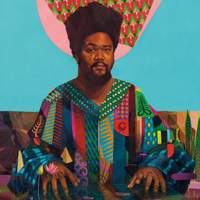Recording of the Week,
Amaro Freitas - Sankofa

Brazilian pianist Amaro Freitas spent the early years of his life in the slums of Racife, a city in the country’s north-eastern region. Growing up in an impoverished household, he would begin learning to play the piano at church - at his father’s behest - despite his house not having one to practice on. It wasn’t until his teenage years that Freitas forged a more personal connection to the instrument, with something of a ‘lightbulb moment’ occurring when he found a Chick Corea live DVD. It wasn’t long after that he began practicing at a local restaurant, who let him use their piano outside of opening hours. His determination paid off, and he soon found himself an in-demand pianist in Racife’s local scene by his early twenties. He formed his own piano trio after meeting bassist Jean Elton and Hugo Medeiros, who have since been with him on every recording he’s made. Both his debut and sophomore albums, 2016’s Sangue Negro and 2018’s Rasif have garnered him progressively more international attention, especially since his signing to Brazillian music-focussed label Far Out Recordings, on which his latest recording, Sankofa, releases today.
Freitas’s music has always subtly interwoven the sounds of Afro-Brazilian music into the traditional arrangement of the jazz piano trio, but Sankofa is his most realised release to date, compounding his idiosyncratic style with a philosophical edge based on the Adinkra symbol of the backward-facing bird. Freitas recounts originally seeing this bird depicted on a patterned robe in Harlem, New York; the bird itself is shown reaching its head toward is back, symbolically encapsulating the Akan phrase “go back and get” and is often associated with the African proverb ”It is not wrong to go back for that which you have forgotten”. For Freitas, this represents an exploration of his cultural roots, particularly through the philosophies and figureheads of Black Brazil, as well as South America’s own history of slavery. The tune ‘Vila Bela’, for instance, takes its name from the region near the Bolivian border that was the site of a Quilombolan (communities of former Afro-Brazilian slaves) resistance against their slavers; while ‘Nascimento’ pays tribute to the state of Minas Gerais, which Freitas hails as a symbol of Black Brazil. This isn’t purely conceptual, though; the music, too, Sankofa is full of subtle nods to diasporic music.

The music of Amaro Freitas is the brilliant kind that offers challenging concepts without losing any of its listenable qualities. Much of the music on Sankofa features Freitas’s signature style of keyboard acrobatics, often covering vast areas of the piano in a single phrase, as well as his penchant for writing dizzying syncopated melodies over odd-time rhythms; take the twinkling melodies peppered throughout Freitas’s compositions, or the cascading waves of dissonant piano on ‘Ayeye’. The opening title track is a mellow slow-tempo piece, the melody dancing between sublime and uneasy, with a beautiful and multi-faceted mid-section that has the band kicking into a faster tempo for some synergised jamming, before landing gracefully back down. ‘Baquaqua’ has the trio dancing over a 5/4-time groove that gives way to an erratic midsection that has them slowing down and speeding up mid-phrase, and yet there’s never a sense that things are falling out of place. Of course these rhythmically challenging pieces would be nothing without a solid rhythm section, and Elton and Medeiros do more than just keep up with Freitas throughout the record; there are several points where Medeiros pulls off some demanding passages with incredible ease, just take a listen to the opening of ‘Ayeye’ as he matches Freitas’s cyclical lead melody with some frenetic drumming of his own. That’s not to say this album is pure hectic chaos; all throughout there’s pockets of some both gorgeous and juicy harmony, and the closing ‘Nascimento’ proves that even with a comparatively down-tempo track, there’s all the same melodic dancing as the rest of Freitas’s pieces.
Amaro Freitas is still something of a rising star, despite his popularity in his home country, but no doubt Sankofa will only further this well-deserved success. Though ostensibly a ‘piano trio’ album on the surface, both the conceptual and challenging yet digestible music make for an excellent listen. It helps that he’s an intriguing player to listen to, too, thanks to his idiosyncratic style born from years of self-study and determination. And Freitas’s journey from a poor boy in the slums to one of the most in-demand jazz players in his home city is the heartwarming icing on the cake; much like the symbolic bird it’s named after, Sankofa reminds us that it’s important not to forget your past.
Available Formats: CD, MP3, FLAC




